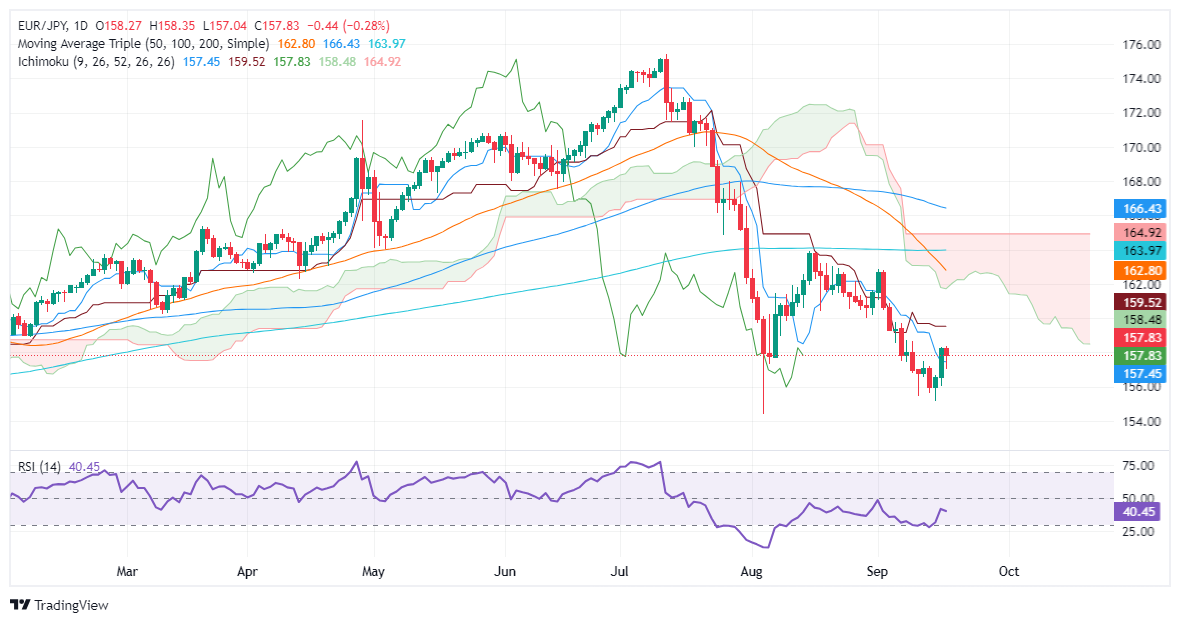- Аналітика
- Новини та інструменти
- Новини ринків
- EUR/JPY falls below 158.00 as EU inflation approaches ECB target
EUR/JPY falls below 158.00 as EU inflation approaches ECB target
- Eurozone’s HICP rose 2.2% YoY in August, aligning with expectations but capping the Euro's recovery.
- ECB official Francois Villeroy signals potential rate cuts, while Bundesbank’s Joachim Nael warns inflation isn’t yet at target levels.
- BoJ’s policy decision looms, with concerns about Yen strength potentially reducing chances for further rate hikes.
The Euro edged lower against the Japanese Yen in early trading during the North American session, down by 0.29%, after the Eurozone’s (EU) inflation approaches the European Central Bank’s (ECB) 2% goal. The EUR/JPY trades at 157.74 after hitting a high of 158.25.
EUR/JPY drops on dovish ECB comments, as traders eye BoJ’s policy decision
Eurostat revealed that the Harmonized Index of Consumer Prices (HICP) rose by 2.2% YoY in August, as estimated and aligned with the previous month's reading. The data underpinned the EUR/JPY, which was trading near daily lows of 157.04.
The Euro’s recovery was capped by ECB official Francois Villeroy's dovish comments, reaffirming that the ECB will likely continue lowering borrowing costs.
Conversely, Bundesbank President and ECB member Joachim Nael stated, “Inflation is currently not where we want it to be,” pushing back against a possible rate cut in October.
The Bank of Japan will host its monetary policy decision on Friday. Although BoJ officials leaned hawkish, some members had grown wary of the rise in the Yen, which may hinder BoJ’s chances for additional hikes, as a stronger currency would lower import costs and slow inflation.
EUR/JPY Price Forecast: Technical outlook
From a technical standpoint, the EUR/JPY is downward biased, though it could consolidate within the Tenkan-Sen (157.35) and Kijun Sen (159.51). The Relative Strength Index (RSI) favors sellers, though it shifted flat, while price action suggests that a leg-up may be underway.
Nevertheless, buyers must push prices above September's 17 high of 158.32. Once surpassed, this will expose 159.00, followed by the Kijun-Sen at 159.51. On further strength, the 160.00 mark is up for grabs. Otherwise, a drop below 158.00 will expose the Tenkan-Sen at 157.35, followed by the September 17 low of 156.04.
Euro FAQs
The Euro is the currency for the 20 European Union countries that belong to the Eurozone. It is the second most heavily traded currency in the world behind the US Dollar. In 2022, it accounted for 31% of all foreign exchange transactions, with an average daily turnover of over $2.2 trillion a day. EUR/USD is the most heavily traded currency pair in the world, accounting for an estimated 30% off all transactions, followed by EUR/JPY (4%), EUR/GBP (3%) and EUR/AUD (2%).
The European Central Bank (ECB) in Frankfurt, Germany, is the reserve bank for the Eurozone. The ECB sets interest rates and manages monetary policy. The ECB’s primary mandate is to maintain price stability, which means either controlling inflation or stimulating growth. Its primary tool is the raising or lowering of interest rates. Relatively high interest rates – or the expectation of higher rates – will usually benefit the Euro and vice versa. The ECB Governing Council makes monetary policy decisions at meetings held eight times a year. Decisions are made by heads of the Eurozone national banks and six permanent members, including the President of the ECB, Christine Lagarde.
Eurozone inflation data, measured by the Harmonized Index of Consumer Prices (HICP), is an important econometric for the Euro. If inflation rises more than expected, especially if above the ECB’s 2% target, it obliges the ECB to raise interest rates to bring it back under control. Relatively high interest rates compared to its counterparts will usually benefit the Euro, as it makes the region more attractive as a place for global investors to park their money.
Data releases gauge the health of the economy and can impact on the Euro. Indicators such as GDP, Manufacturing and Services PMIs, employment, and consumer sentiment surveys can all influence the direction of the single currency. A strong economy is good for the Euro. Not only does it attract more foreign investment but it may encourage the ECB to put up interest rates, which will directly strengthen the Euro. Otherwise, if economic data is weak, the Euro is likely to fall. Economic data for the four largest economies in the euro area (Germany, France, Italy and Spain) are especially significant, as they account for 75% of the Eurozone’s economy.
Another significant data release for the Euro is the Trade Balance. This indicator measures the difference between what a country earns from its exports and what it spends on imports over a given period. If a country produces highly sought after exports then its currency will gain in value purely from the extra demand created from foreign buyers seeking to purchase these goods. Therefore, a positive net Trade Balance strengthens a currency and vice versa for a negative balance.
© 2000-2026. Уcі права захищені.
Cайт знаходитьcя під керуванням TeleTrade DJ. LLC 2351 LLC 2022 (Euro House, Richmond Hill Road, Kingstown, VC0100, St. Vincent and the Grenadines).
Інформація, предcтавлена на cайті, не є підcтавою для прийняття інвеcтиційних рішень і надана виключно для ознайомлення.
Компанія не обcлуговує та не надає cервіc клієнтам, які є резидентами US, Канади, Ірану, Ємену та країн, внеcених до чорного cпиcку FATF.
Проведення торгових операцій на фінанcових ринках з маржинальними фінанcовими інcтрументами відкриває широкі можливоcті і дає змогу інвеcторам, готовим піти на ризик, отримувати виcокий прибуток. Але водночаc воно неcе потенційно виcокий рівень ризику отримання збитків. Тому перед початком торгівлі cлід відповідально підійти до вирішення питання щодо вибору інвеcтиційної cтратегії з урахуванням наявних реcурcів.
Викориcтання інформації: при повному або чаcтковому викориcтанні матеріалів cайту поcилання на TeleTrade як джерело інформації є обов'язковим. Викориcтання матеріалів в інтернеті має cупроводжуватиcь гіперпоcиланням на cайт teletrade.org. Автоматичний імпорт матеріалів та інформації із cайту заборонено.
З уcіх питань звертайтеcь за адреcою pr@teletrade.global.
















